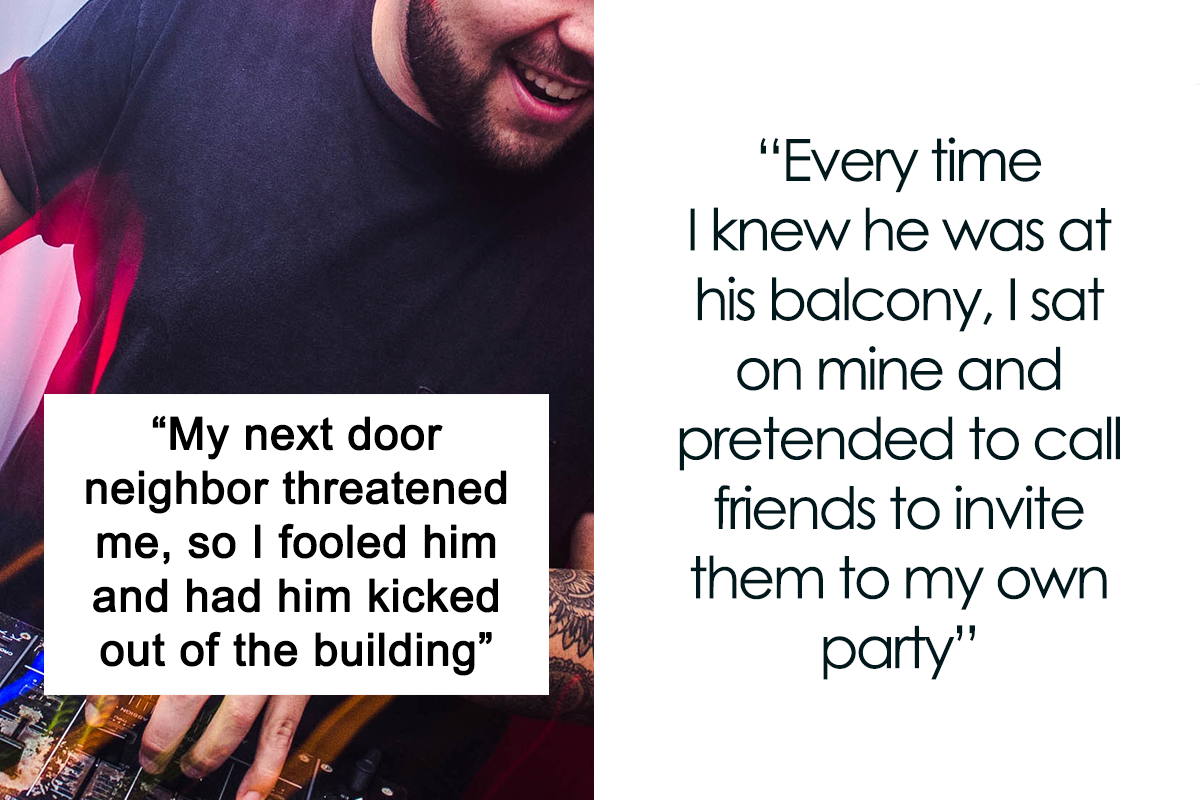
“Third Strike, Bye Bye”: Guy Makes Annoying Neighbor Break The Rules By Throwing A Fake Party
Being neighborly doesn’t mean you have to befriend the entire community. Common sense and respect are usually enough. Still, that’s too much to ask from some.
Last week, Reddit user ChileDoesntExist submitted a post to the platform’s ‘Petty Revenge‘ community, in which he reveals how he got back at the obnoxious man who used to live next door.
The jerk threw huge, loud parties and was openly confrontational to the point where he insisted on settling their differences with fists.
So the Redditor decided to get rid of him, and did so on his own terms, using clever deceit instead of angrily throwing punches.
This man had a neighbor who would throw loud parties and threaten him
Image credits: Maurício Mascaro (not the actual photo)
So he devised a savage revenge plan to use his ‘hobby’ against him
Image credits: Michael Burrows (not the actual photo)
Image credits: Michael Förtsch (not the actual photo)
Image credits: chiledoesntexist
Sadly, this story is a reflection of the broader picture. According to a study by Find Law, a popular legal information website, 42% of Americans say they have had a dispute with their neighbors.
The good thing is that they’re still a minority; the survey found that the remaining respondents – 58 percent – say that they have never had a dispute with a neighbor.
As it was the case in the post, noise was the most common complaint between neighbors, accounting for nearly half of all disputes.
Here are the issues and their prevelence:
- Noise 48%;
- Pets and animals 29%;
- Children’s behavior 21%;
- Visual nuisance, property appearance, trash, etc. 18%;
- Property boundaries 17%;
- Suspected criminal behavior 8%;
- Health or building code violations 4%;
- Parking 1%.
86% of people who had disputes said they took some kind of action, usually in the form of discussing the issue directly with the neighbor or sending them a note or email. Only fourteen percent of people with a dispute took no action at all:
- Discussed issue personally with neighbor 49%;
- Called police 27%;
- Notified neighborhood or owners’ association 15%;
- Sent letter, note, or email 11%;
- Went to court 4%;
- Went to mediation 4%;
- Other actions 4%;
- Took no action 14%.
“Neighborhoods form dynamic communities with unique personalities, since a group of unrelated people must live close together,” said Stephanie Rahlfs, an attorney and editor with Find Law. “Most often, neighbors are friendly, but occasionally, disputes will arise.”
The key is to deflate them. Not escalate.
People thought the original poster (OP) handled the situation beautifully
I'm sorry but no. Both are a******s. One for throwing a huge noisy party on a sunday (sure it was the world cup, and it's like once every 4 years, added to that that no country wins repeteadly, so it was actually once in a lifetime), but he "threatend him", so yeah a*****e. The poster is as much of an a*****e and a bully. He used a position of perceived power (the landlord likes me and does what I want) to get someone kicked out of their apartment for throwing a New year party on one of the days that literally everyone in the world goes to parties or get togethers (even the a*****e poster).
Especially when the neighbor seemingly learned a lesson as he asked the landlord beforehand if he could have a small party on NEW YEARS EVE!
Load More Replies...I love to party and I get loud and rowdy when I do. You know what I DON'T do? Have a huge party in an apartment building. I don't get drunk and threaten to beat up a neighbor who politely asks me to turn the music down and be considerate of other people. What I DO is throw a huge party out in the woods where no one will hear us. If I DO have a party within city limits I make sure to adhere to all posted noise and activity guidelines jn the apartment and/or city. If I do all that and a neighbor STILL asks me to be quiet, I make sure to apologize, ask them to come in, and let all my guests know to keep it down regardless. The OP didn't DO anything except make this idiot think he would have a party which somehow meant EVERYONE could ans the dozens/hundreds of other tenants wouldn't mind?
Load More Replies...I'm sorry but no. Both are a******s. One for throwing a huge noisy party on a sunday (sure it was the world cup, and it's like once every 4 years, added to that that no country wins repeteadly, so it was actually once in a lifetime), but he "threatend him", so yeah a*****e. The poster is as much of an a*****e and a bully. He used a position of perceived power (the landlord likes me and does what I want) to get someone kicked out of their apartment for throwing a New year party on one of the days that literally everyone in the world goes to parties or get togethers (even the a*****e poster).
Especially when the neighbor seemingly learned a lesson as he asked the landlord beforehand if he could have a small party on NEW YEARS EVE!
Load More Replies...I love to party and I get loud and rowdy when I do. You know what I DON'T do? Have a huge party in an apartment building. I don't get drunk and threaten to beat up a neighbor who politely asks me to turn the music down and be considerate of other people. What I DO is throw a huge party out in the woods where no one will hear us. If I DO have a party within city limits I make sure to adhere to all posted noise and activity guidelines jn the apartment and/or city. If I do all that and a neighbor STILL asks me to be quiet, I make sure to apologize, ask them to come in, and let all my guests know to keep it down regardless. The OP didn't DO anything except make this idiot think he would have a party which somehow meant EVERYONE could ans the dozens/hundreds of other tenants wouldn't mind?
Load More Replies...
 Dark Mode
Dark Mode 

 No fees, cancel anytime
No fees, cancel anytime 



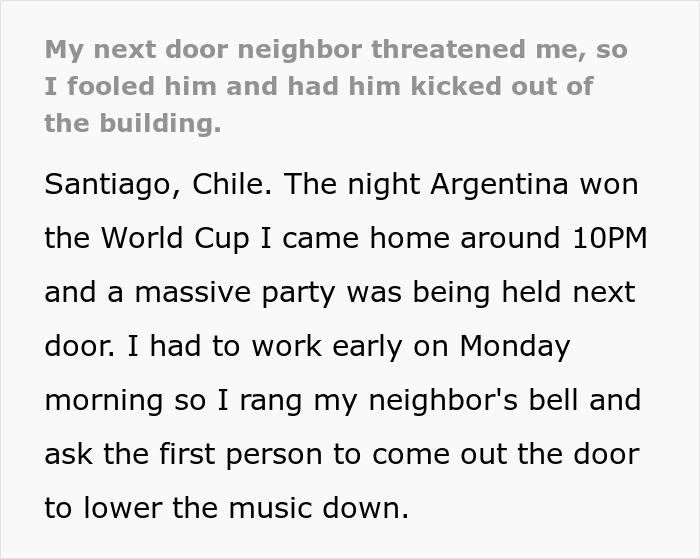
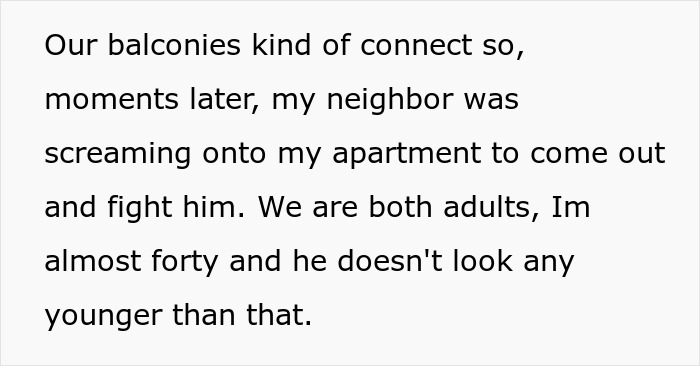
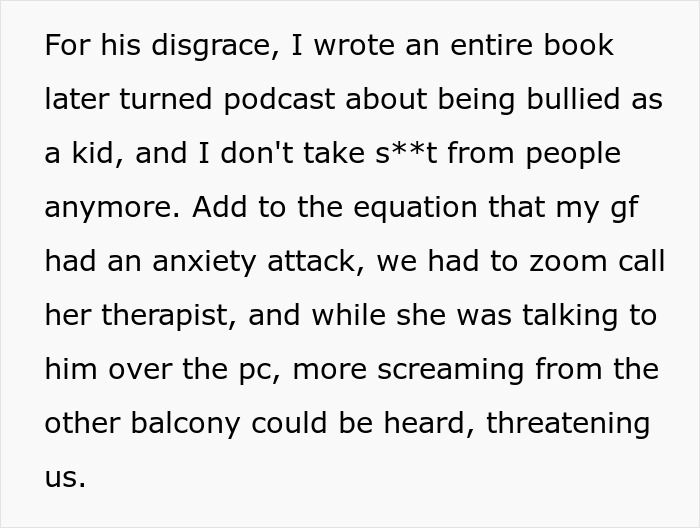


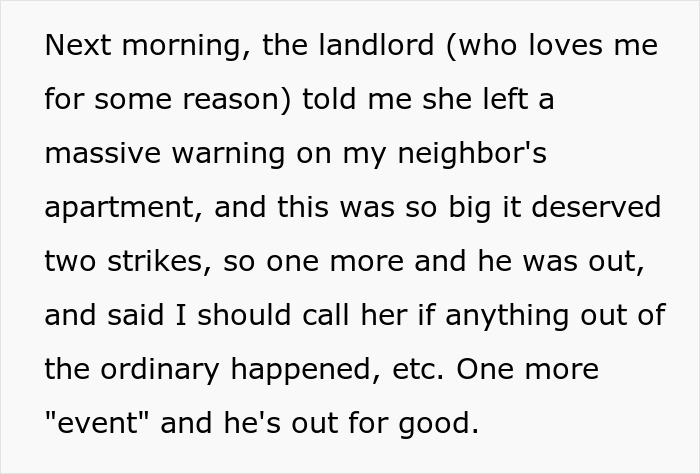

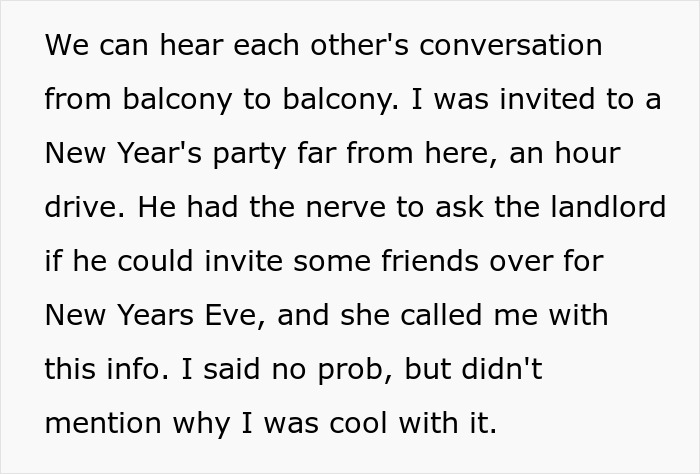
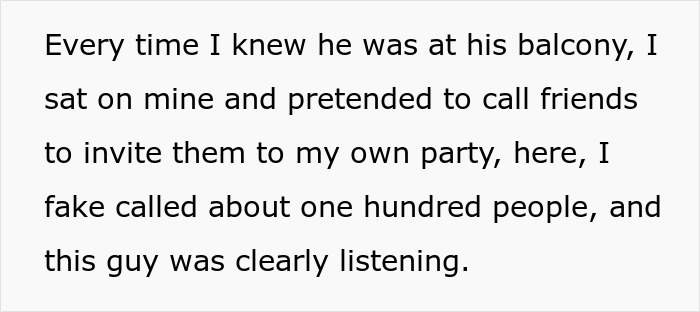




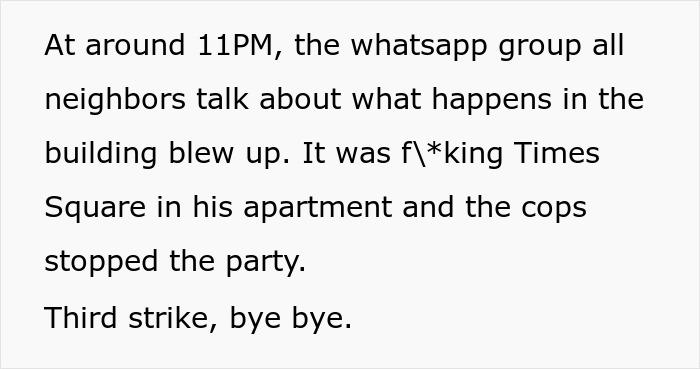



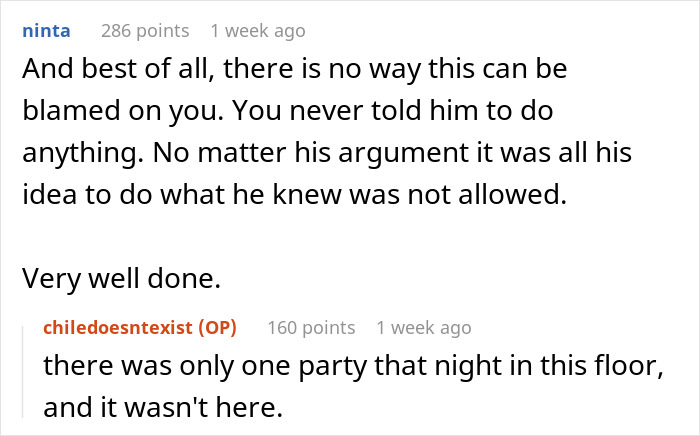











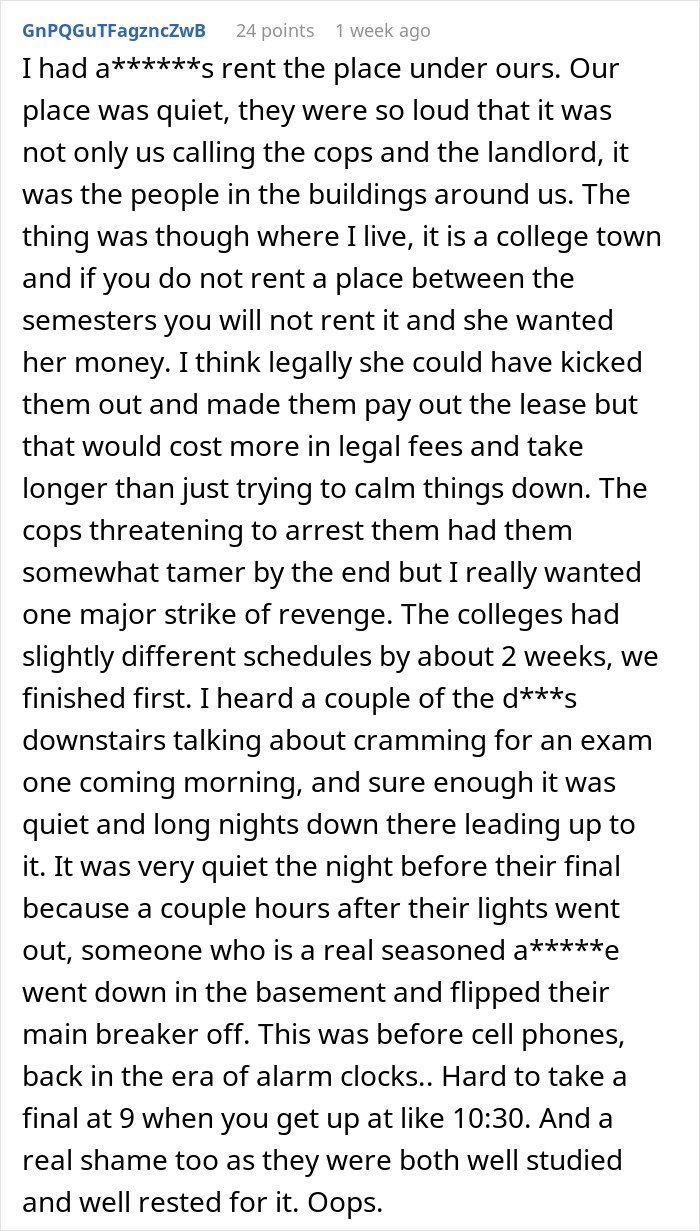







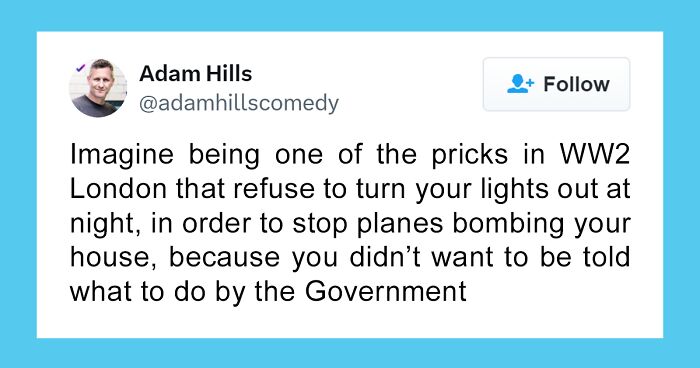

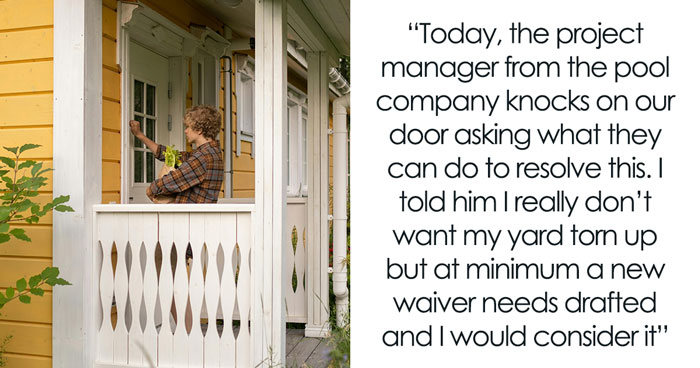
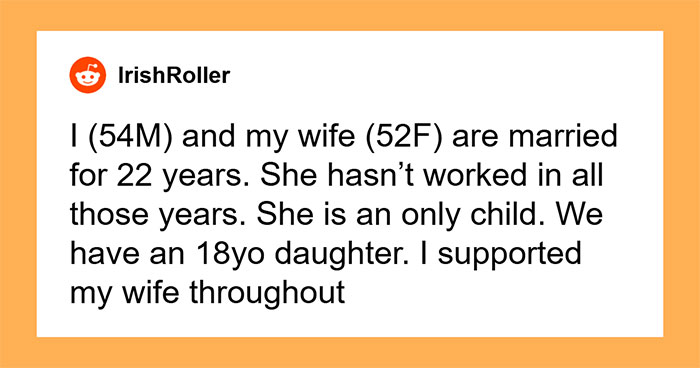












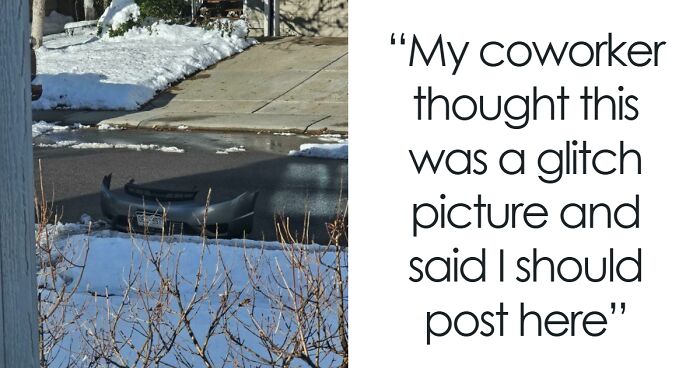
74
15